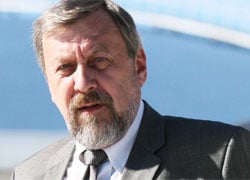On the verge of new relations
23- Andrei Sannikov, “Narodnaya Volya”
- 22.10.2010, 13:03

Lukashenka’s doddering economic model not only prevents from doing business in Belarus normally, but also hinders the regional cooperation.
Last week an interesting round table discussion was held in Moscow. It was organized by the Institute of Topical International Problems of the Diplomatic Academy of the Foreign Affairs Ministry of Russia. The invitation to participate in the discussion of the issue “Russia-Belarus: Prospects of Bilateral Relations” was rather unexpected for me. The list of participants of this round table discussion was mostly orientated to official Belarusian authorities. Institutes and bodies supporting Lukashenka for many years and considered him the only partner of Russia in Belarus were represented there.
Before the round table Sergei Naryshkin, Head of the Administration of the President of Russia, held a briefing for Belarusian journalists. Natallia Radina, a journalist of the popular Belarusian news website charter97.org, was present there as well.
The invitation to the press-conference in the Kremlin is an event for every Belarusian journalist. But it was an important event for Natallia Radina twice. She had taken part in many press-conferences in many capitals of the world and has taken interviews of the world political leaders, including Vladimir Putin in Sopot, however she was in Moscow for the first time.
For the last 16 years the Russian political elite had almost no communication with representatives of the Belarusian opposition and independent journalists, regarding Lukashenka as the only guarantor of “fraternal” relations. Every word of Lukashenka about sacred friendship gave him billions of dollars, taken from the pockets of Russian taxpayers. The scheme was working flawlessly, however behind the words’ screen of the dictator Russia seemed to stop noticing the processes going on in Belarus, and was hearing only propagandists serving to the totalitarian regime. Conferences and seminars were held in Minsk and Moscow under the umbrella of the “union state”, where participants from the both sides were painting a rosy picture of problem-free relations.
Now everything has started to change. In the statements of the leaders of Russia, leading analysts, public leaders, ideas about necessity to review the relations with Belarus are heard. Even the most energetic supporters of dictator Lukashenka, like Konstantin Zatulin and Sergei Markov, started to estimate the situation in Belarus in a different way.
During the round table discussion at the Diplomatic Academy participants split into two parts: one part defended the old approach and tried to find something good in Lukashenka’s behaviour, while the majority tried to understand how the relations between the two states could be brought back to normal. Notably, the “union state” was harshly criticized by Russian participants, as a non-working model.
Though the attitude to the Belarusian-Russian relations was different, many participants of the discussion found a common ground in saying that the state systems of Russia and Belarus are diverging more and more, and the gap between the economic models of the both states is increasing. There could be no other situation. Lukashenka did not used Russian donations for reforming the economy, but for subduing it to a state control and pressure. Russia has finally come to an understanding that the doddering economic model of Lukashenka not only prevents from doing business in Belarus normally, but also hinders the regional cooperation. Belarus’ advantageous situation of Belarus as a transit country turned out to be a hindrance in the trade and economic ties of the region.
The word “modernization” which has appeared in the vocabulary of the Russian leadership, is not understandable for everyone, and as the discussion has demonstrated, is not accepted by all. But as it seems, this word could become a key to the new relations between Belarus and Russia. We live in a new millennium; informational technologies have changed the world and concepts of the world. Modern challenges have nothing in common with the number of armored fighting vehicles at the perimeter of the state’s borders.
It is necessary to make a little effort and realize that countries of the European Union, Russia and Belarus should embark on a new strategy of relations, answering the challenges of the 21st century. In the framework of this strategy Russia needs Belarus which would be integrated in Europe, which would strengthen its positions in the EU and intensify processes of creation of a new modern architecture of security in Europe.
There were my professors from the Diplomatic Academy where I once studied, among the participants of the round table, in particular, Boris Shmelev, Head of the Center for Comparative Political Studies at the Institute of International Economic and Political Studies, Russian Academy of Sciences, and my opponents in the talks for disarmament and security, for instance, General Leonid Ivashov, Vice-president of the Academy on Geopolitical Affairs. I am thankful for professors for the skill to make friends, not enemies. They were strong and knowledgeable opponents, they had long experience of battles with the US and they were sensitive to insistence of independent states in defending their national interests. However, we found solutions and transformed them into the language of agreements which are still valid and observed to the present day.
Unexpectedly, the fact that the new approaches are promising had been proved true in just a few days. At the meeting of leaders of Russia, Germany and France in Deauville French President Nicolas Sarkozy stated that creation of a single economic space of the EU and Russia with a visa-free regime is a matter for the measurable future, and the EU representatives announced that on November 22 Ukraine could be offered transition to such a regime with the EU. We must take part in these talks already, but it could happen only after the change of power in our country.
Andrei Sannikov, a political observer, “Narodnaya Volya”










